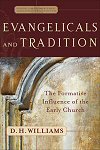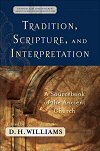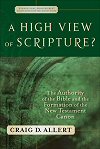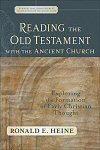Evangelical Ressourcement Series (4 vols.)
Digital Logos Edition
Overview
The Evangelical Ressourcement series is grounded in the belief that there is a wealth of theological, exegetical, and spiritual resources from the patristic era that is relevant for the Christian church today and into the future. Amid the current resurgence of interest in the early church, this series aims to help church thinkers and leaders reappropriate these ancient understandings of Christian belief and practice and apply them to ministry in the twenty-first century.
The Evangelical Ressourcement series is perfect if you’re a student, scholar, pastor, or layperson interested in the most pressing contemporary topics relating to early church history, theology, and spirituality. Scripture passages link directly to your English translations and original language texts, and important theological concepts link to dictionaries, encyclopedias, and a wealth of other resources in your digital library. In addition, you can perform powerful searches by topic and find what other authors, scholars, and theologians have to say about the impact of the early church’s writings, culture, and thought.

Key Features
- Presents historical insight on contemporary challenges facing today’s church
- Examines tradition in the early church
- Analyzes the formation of the New Testament canon
- Studies the early church’s primary sources and influence
Product Details
- Title: Evangelical Ressourcement Series
- Series: Evangelical Ressourcement: Ancient Sources for the Church’s Future
- Publisher: Baker Academic
- Volumes: 4
- Pages: 796
- Resource Type: Topical
- Topic: Historical Theology
Individual Titles
- Evangelicals and Tradition: The Formative Influence of the Early Church by D.H. Williams
- Tradition, Scripture, and Interpretation: A Sourcebook of the Ancient Church by D.H. Williams
- A High View of Scripture?: The Authority of the Bible and the Formation of the New Testament Canon by Craig D. Allert
- Reading the Old Testament with the Ancient Church: Exploring the Formation of Early Christian Thought by Ronald E. Heine
This title is included in the following collections
You can save when you purchase this product as part of a collection.
Baker Ultimate Collection 2022...
$38,273.89$30,599.99

Evangelicals and Tradition lays the groundwork for the Evangelical Ressourcement series by examining the concept of tradition—its definition, origin, and components. Williams addresses the issue of tradition and authority in the early church and discusses the relationship between tradition and the Protestant “traditions” of sola scriptura and sola fide. Finally, he examines numerous examples of how tradition was used in the early church, including confessions of faith, catecheses, rules of faith, commentaries, homilies, theological hymnody, and theological works.
Williams has brought a new sense of engagement to the ancient task of relating Scripture, tradition, and spiritual experience. Evangelicals need to be reminded that there is a truly catholic tradition that goes back to the apostles that belongs to them as much as it does to other Christians. This book roots us in the living faith of every age and should be welcomed by everyone who wants to grow in the knowledge and love of Christ.
—Gerald Bray, research professor of divinity, Beeson Divinity School, Samford University
There is a great need today to get behind the Reformers and rediscover the sources of their theology and piety. The substance of the great fathers of the church will propel evangelicals into a deeper level of theological thought and ecumenical dialogue. Evangelicals and Tradition will initiate that discussion and lead the way.
—Robert Webber (1933–2007), Emeritus Myers Professor of Ministry, Northern Seminary
In this book, Williams expands an argument he has made before—that discerning appropriation of the early church is not just a proper but a necessary task for evangelical Protestants. Williams’ careful recommendation of catholic tradition should promote the right kind of theological and practical reflection among his intended audience. His unusually balanced and well-grounded presentation should make the book helpful for Roman Catholics and the Orthodox as well.
—Mark A. Noll, Francis A. McAnaney Professor of History, University of Notre Dame
This is a brief and accessible primer by a major evangelical historian on the indispensability of tradition for the church’s life and worship. Written especially for free church Christians, Evangelicals and Tradition is a manifesto urging evangelicals to embrace the church’s most ancient tradition, the age of councils and creeds. Williams shows that tradition is a form of communal memory and that, without its steadying presence, Christian congregations—even if they flourish in the springtime of their lives—will in time languish and wither.
—Robert Louis Wilken, William R. Kenan Jr. Professor of the History of Christianity, University of Virginia
Here is a classic introduction to theology. Focused on evangelicals, its deep vision and sharp statement make it invaluable for all Christians. In nearly 35 years of teaching introductory courses, I have never seen such a beneficial book about the nature of theology: small, packed, and clear. We are all in Williams’ debt for this project.
—Frederick W. Norris, emeritus professor of world Christianity, Emmanuel Christian Seminary
In response to the pressures of modern culture, the church has dulled its message. But that message can regain its edge if evangelicals will listen to the demands of the gospel through the ears of the church fathers. Tradition used to be a ‘fightin’ word’ for Protestants, but Williams argues that, with the proper approach, tradition can be evangelicals’ ally instead of their enemy.
—David Neff, editor and vice president, Christianity Today
D.H. Williams is professor of religion in patristics and historical theology at Baylor University. He is the author of Retrieving the Tradition and Renewing Evangelicalism and the editor of The Free Church and the Early Church.

Tradition, Scripture, and Interpretation introduces the reader to primary sources from the first through sixth centuries with an emphasis on lesser-known, yet nonetheless important, texts.
The selections are grouped thematically and cover various crucial topics, including the rule of faith, baptismal formulations and instruction, creeds, and biblical interpretation. Within each theme, the writings are arranged chronologically, revealing how the Christian tradition on that topic developed over time. Explanatory notes provide historical background and theological context for each reading. Williams introduces the book with a chapter examining the close interplay between Scripture and tradition in the thinking of the early church. This rich resource will be especially useful to students of the early church.
Please note that this volume will only contain the explanatory notes.
Williams . . . provide[s] helpful comments and historical notes with most excerpts, as well as a clearly written, contextual introduction. General readers motivated to digest the many broad-ranging . . . selections will be rewarded with insights into early Christian thinking on literal vs. allegorical interpretation of Scripture, the development of local and conciliar creeds, and the slow, distributed development of the Bible as canon. Recommended . . . for Williams’ cogent introduction and the anthology’s fit into a relatively unpopulated niche in the literature.
—Library Journal
[A] helpful volume for understanding the importance of the early Christian church. . . . Williams provides a sampling of early Christian sources in an easily accessible format so that one interested in early church history and Christian origins can read and understand the primary documents. . . . Williams argues convincingly that the canon of the Bible and its interpretation came from the early church. . . . This volume certainly accomplishes the goal of the Evangelical Ressourcement series, which is to help church thinkers and leaders reconsider the ancient understandings of Christian belief and practice. It would be of value in introductory church history classes.
—Review of Biblical Literature
The anthology affords the reader the opportunity to encounter the most crucial texts in established resources. . . . The passages Williams assembles in the chapters on the interpretation of the Bible are especially fascinating. . . . Tradition, Scripture, and Interpretation would serve well as an introductory college textbook.
—Trinity Journal
[The] Evangelical Ressourcement series seeks to show that the early church’s import for Protestants is not less ‘integral’ than ‘it is for Roman Catholicism or Eastern Orthodoxy.’ With D.H. Williams’ volume Tradition, Scripture, and Interpretation the series succeeds admirably. The book is a companion source-volume for Williams’ previous book, Evangelicals and Tradition, but is plenty readable on its own.
—Books & Culture
Williams’ work is recommended for both the student and the church leader. The comments following the selections are especially helpful for the novice and Williams includes a brief bibliography at the end of the work to facilitate further study of the early fathers. The book serves as a good introduction to the primary source texts on the topic and the brevity of the work is refreshing since the beginner can easily become overwhelmed at the amount of primary texts available from the period of the early church.
—Southwestern Journal of Theology
[Williams] is widely respected for his numerous book-length studies and journal articles on the fathers and their achievements. . . . The present work consists in selected extracts from the most significant writers of the period, together with numerous creedal statements. The texts are arranged according to nine themes or subjects and are prefaced by Williams’ own most illuminating Introduction. The book was conceived as a companion volume to the author’s Evangelicals and Tradition. . . . But the Introduction and the brief commentaries throughout make it a more than worthwhile book in its own right. . . . Its great advantage . . . is the focus which it gives to its chosen themes: Scripture, tradition, and their vital interplay in the minds of the church’s foundational theologians.
—Journal of Reformed Theology
D.H. Williams is professor of religion in patristics and historical theology at Baylor University. He is the author of Retrieving the Tradition and Renewing Evangelicalism and the editor of The Free Church and the Early Church.

For most evangelicals, a key tenet of belief is a “high view of Scripture,” often defined as adherence to a verbal plenary inspiration view, along with the subsequent doctrine of inerrancy this view assumes. In this thought-provoking book, Craig Allert questions whether this view is in fact high enough. In particular, he averts that our view of the Bible has not been sufficiently informed by how the New Testament canon was formed in the early centuries of the church. While maintaining that Scripture is authoritative and inspired, he also believes that the tension between Scripture’s nature as both a divine document and a human document has often been skewed too far toward the divine.
Seeking to remedy this imbalance, Allert examines various theories of the historical development of the New Testament canon. In addition, he explores how the early church fathers viewed Scripture, canon, inspiration, and authority, coming to the conclusion that while promoting a high view of Scripture, the patristic view does not necessarily line up with the modern conservative evangelical view. Finally, from these conclusions he proposes twenty-first-century implications for how we view Scripture.
There are two ways to regard this book: either as a foolhardy attempt to undermine the high evangelical regard for the inspired Scriptures or as a constructive plea for a more faithful evangelicalism that takes seriously the historical background of New Testament canon formation. Allert’s passionate insistence on historical integrity and his disarming honesty and candor will render it necessary for us to engage in serious soul searching about our approach to Scripture. This book’s convincing argument is also an opportunity for evangelicals to reassert the centrality of both church and tradition and to take both much more seriously than has often been the case. The vigor and erudition with which Allert locates the New Testament in the ecclesial context of the tradition puts evangelicalism firmly in his debt. The way we read this book will be a clear indication of the future of evangelicalism.
—Hans Boersma, J.I. Packer Professor of Theology, Regent College
Craig Allert asks how it is possible to have a ‘high view’ of Scripture if it is detached from the realities of the origin and formation of the Bible. He draws attention to the problems that evangelicals face when they lose the historical context of their theological affirmations, and he offers an important summary of the development of the Bible in early Christianity. Allert questions several cherished views widely held in the North American evangelical context. His volume has the potential of opening up a useful dialogue among evangelicals on the origin and nature of Scripture and its relation to contemporary theological issues. I commend this book to pastors, students, and biblical scholars who want a challenging discussion of these important issues.
—Lee Martin McDonald, professor of New Testament studies, Biola University
Craig Allert has written an informed and coherent account of the issues involved in the formation of the canon. A High View of Scripture? is a timely and nuanced critique of the anachronistic approach to canon studies adopted by too many evangelical scholars. Allert’s book is a valuable addition to the Evangelical Ressourcement series and will surely be a valuable aid in helping evangelicals understand and value ever more deeply the wonder and authority of the Holy Spirit, the Scripture, and the church itself.
—Christopher A. Hall, chancellor, Eastern University
I have now read through Craig Allert, A High View of Scripture? and wish to commend it to you. . . . The major thrust—in fact, it dominates the book—of Allert’s intelligent and important book is that one is hard-pressed to believe in the Bible without believing in the process the Church used to discern those books. In other words, the notion that we can believe in the Bible alone wrecks against the reality that Bible was never alone and is never alone. There is always a church with it. To believe in the Bible is a tacit belief in the church that discerned which books were in the ‘canon.’
—jesuscreed.org
Evangelical theologians have spilled much ink describing and defending the authority of the Bible. Fewer Evangelicals, however, have given careful thought to how the various documents that make up the Bible finally came to be included. Craig Allert helps rectify this omission. . . . A High View of Scripture? is an excellent introduction to the formation of the New Testament canon. And Allert presents a worthy critique of those theologies that tend to cut the Bible off from the same church that wrote, canonized and interpreted it.
—Faith Today
[Allert’s] historical survey, which covers the majority of the book, is extremely clear and readable. It is a superb introduction to the issues of canonicity, accessible to a layperson yet deep enough to interest a theologian, and is well worth having in any library.
—Calvin Theological Journal
Craig D. Allert is associate professor and chair of religious studies at Trinity Western University in Langley, British Columbia. He has published journal articles in the area of New Testament canon studies and bibliology and is the author of Revelation, Truth, Canon, and Interpretation.

Reading the Old Testament with the Ancient Church: Exploring the Formation of Early Christian Thought
- Author: Ronald E. Heine
- Series: Evangelical Ressourcement: Ancient Sources for the Church’s Future
- Publisher: Baker Academic
- Publication Date: 2007
- Pages: 208
The contemporary church dismisses Christianity’s foundational Scriptures at its own peril. However, the teachings of the Old Testament are less and less at the center of congregational preaching and conversation. The early church fathers—visionaries such as Augustine, Origen, and Tertullian—embraced the Hebrew Scriptures, allowing the Old Testament to play a central role in the formation of their beliefs. As today’s Christians struggle to relate to concepts such as the Jewish law and the prophets, pastors and students benefit from looking through the lenses of these thoughtful pioneers. This volume helps the Old Covenant to come alive.
Ron Heine has written Reading the Old Testament with the Ancient Church for a wide variety of readers: pastors, New Testament and patristics scholars, and general lay readers. This is a very helpful introduction to the ways the ancient Christian writers viewed the Scriptures. Heine comes to the subject with a significant grasp of both primary sources and contemporary scholarship. The argument is illuminating and inspiring.
—Thomas C. Oden, emeritus professor, Drew University
Ronald Heine brings together two contemporary interests: renewed attention to the Old Testament as Christian Scripture and rediscovery of the church fathers. He offers the reading of the Old Testament with the church fathers as guidance for the contemporary church’s use of the whole Bible. His endorsement of a spiritual reading of the Old Testament means not a rejection of history but a going beyond history for what is ‘useful’ for Christian living. Examining how the church fathers read the Law, History, Prophets, and Psalms becomes an effective plea for using the church fathers in present-day understanding and preaching of the Old Testament, for the fathers’ usage is rooted in New Testament practice. The early church’s example is a call to do more than understand the text; it is a call to live in and to mold life by the text. I recommend this excellent book to a wide readership.
—Everett Ferguson, distinguished scholar in residence, Abilene Christian University
Heine’s overview of the uses of and attitudes toward Jewish Scripture in the ancient church is offered as a corrective to a very common neglect of and lack of appreciation for this topic among lay and leadership audiences in evangelical churches. His lucid prose is eminently readable and his concise summaries include a wide array of authors from Christian late antiquity. This handy volume seems well designed for its audience, who will benefit greatly from Heine’s scholarship on this topic.
—Michael A. Williams, professor of comparative religion and Near Eastern languages and civilization, Jackson School of International Studies, University of Washington
Ron Heine’s Reading the Old Testament with the Ancient Church fills a gap in the history of biblical interpretation. The work is comprehensive in scope, yet it provides carefully crafted, succinct treatments of major patristic writers that reflect close, informed reading of the primary sources. Only someone who has lived with these patristic authors and pored over their writings could produce such a lively, sympathetic treatment. Both specialist and nonspecialist readers will benefit from this richly detailed exposition.
—Carl R. Holladay, Charles Howard Candler Professor of New Testament, Candler School of Theology
An excellent book that will be helpful in assimilating the Old Testament personally and as a result in preaching the Old Testament.
—Preaching
Heine has displayed his expertise in patristics. . . . [This book] is accessible to a broad scope of readership. Heine’s analysis contains insights that are useful for those in academic or pastoral settings, and at the same time curious laity can easily follow Heine’s prose in order to receive a reliable primer on how early Christians perceived the Old Testament.
—Journal of the Evangelical Theological Society
Ronald E. Heine is professor of biblical studies at Northwest Christian University in Eugene, Oregon. He is the author of several books on Origen.
Reviews
2 ratings

Ralph A. Abernethy III
9/7/2017

Eric Hillegas
7/25/2013